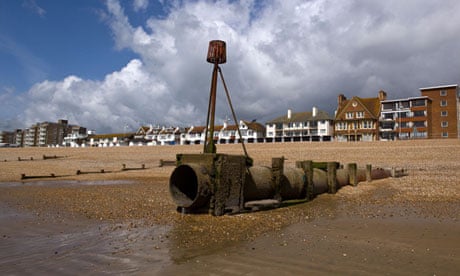The most persistent and frequent polluters of England's rivers and beaches are the nation's 10 biggest water companies, an Observer investigation has revealed.
The companies, which are responsible for treating waste water and delivering clean supplies, have been punished for more than 1,000 incidents in the past nine years, but fined a total of only £3.5m.
The revelations have raised concern that the financial penalties are far too low to change the behaviour of an industry that generates billions of pounds in profits and shareholder dividends. The charge is backed by the Sentencing Council for England and Wales, which is proposing major hikes in penalties.
Pollution incidents, which have included sewage illegally pouring into a harbour for more than a year, and managers destroying records, show no sign of declining, according to data obtained from the Environment Agency (EA) under freedom of information rules. Only a third of the 1,000 incidents led to a fine (of an average of just £10,800); the rest resulted in cautions.
"In law, the 'polluter pays' principle is supposed to deter companies from damaging the environment, but in this case the penalties appear to be so pitiful that water companies seem to be accepting them as the price of doing business," Joan Walley MP, chair of the Environmental Audit Committee (EAC), told the Observer. "The sentencing council must ensure that courts take into account the profits made from environmental crimes, and that fines have a sufficient deterrent effect."
Simon Hughes MP, deputy leader of the Liberal Democrats, said: "These figures are another indictment of the failings of our privatised water companies in England. Many of them make large profits, pay huge dividends, increase prices and pay little tax. When, in addition, these figures show they don't deliver clean water, the public is entitled to say that our monopoly water providers are neither good corporate citizens nor good stewards of our precious environmental assets."
In November the Observer revealed that three of Britain's biggest water companies paid little or no tax on their profits in 2012 while generously rewarding their executives and investors. The water industry was paid £10.5bn by customers in 2010-11, according to the latest Ofwat figures available, while making pre-tax profits of £1.7bn and paying dividends of £2.2bn, a 42% year-on-year rise. In 2013-14, water bills are rising by 3.5%, above both inflation and average pay rises.
One in three of the pollution incidents involved sewage. Karen Gibbs of the Consumer Council for Water said: "Sewer flooding is particularly distressing for customers, and something we have pressed the companies to address as a priority."
The cleanliness of England's beaches has declined in recent years, after improvements in the decades before, and most water bodies currently fail higher-level European water regulations.
The EA data, obtained by the Request Initiative and analysed by the Observer, showed the most heavily fined company in 2005-2013 was Thames Water, which paid £842,500 for 87 incidents.
Thames Water also incurred the biggest single fine – £204,000 in 2011 for 15 related incidents when untreated sewage burst from a sewer the company had failed to repair into streets and gardens in the London borough of Bromley. The company accepted the fine after an eight-year legal fight, which reached the European court of justice.
A spokesman for Thames Water said its record should be seen in the context of its running 108,000km of sewer pipes and serving 24% of the UK population. It was investing £1bn a year to upgrade its network, he said.
United Utilities Water was the most frequently punished company, with 242 incidents since 2005. It was fined £200,000 in 2012 for allowing sewage to pour into the river Keekle in Cumbria on 22 occasions.
Anglian Water was the third most heavily fined company, including £150,000 in 2008 for three incidents at Newmarket sewage treatment works. In one, the works manager destroyed data and coerced colleagues to falsify records, while another caused a major fish kill.
A spokesman for Water UK, which represents the water companies, said: "We never want to see incidents of pollution. Water companies invest billions of pounds each year to safeguard the natural environment while providing people with high-quality water to drink and healthy rivers, beaches and bathing waters to enjoy. While it's widely accepted that there is still room for improvement, there is clear evidence of progress in many areas."
The sentencing council's draft guidelines direct that for deliberate pollution incidents by large companies and with the most serious environmental impacts, the standard fine should be £750,000 but could be varied between £250,000 and £2m depending on circumstances.











Comments (…)
Sign in or create your Guardian account to join the discussion